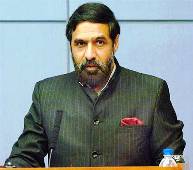 | « Back to article | Print this article |
 India's commerce and industry minister Anand Sharma said in Washington, DC he had impressed upon US officials that India is committed to a successful conclusion of the Doha Round of the World Trade Organization.
India's commerce and industry minister Anand Sharma said in Washington, DC he had impressed upon US officials that India is committed to a successful conclusion of the Doha Round of the World Trade Organization.
Sharma met US trade representative Ron Kirk, agriculture secretary Tom Vilsack and deputy assistant to the president and deputy national security advisor for International Economic Affairs Michael Froman and other senior Obama Administration officials.
In a lengthy interaction with the media at the end of his three-day visit, Sharma also declared that the ministerial he had hosted in New Delhi last year had jump-started the stalled negotiations of the Doha Round.
He said his meetings, which he described 'useful and successful', had also laid the groundwork for an excellent trade and commerce outcome for US President Barack Obama's forthcoming visit to India.
Sharma, who said his meetings constituted 'the first economic interaction after the successful visit of Prime Minister, Dr Manmohan Singh to the US in November 2009,' had afforded an opportunity to 'exchange notes on the progress in Geneva,' even as the negotiators continued their engagement.
"You would recall that India had taken an initiative to reenergise the stalled Doha Round of the WTO by reaching out to the coalition partners in the developing countries and also the key interlocutors in the developed countries", Sharma said.
"India impressed upon the need to enhance global trade by putting in place an ambitious but also fair and equitable multilateral trade regime, which would strengthen global commerce at a time when the world was challenged by the economic crisis", he added.
"It has been our considered view and remains so -- as our prime minister has said -- that in difficult times, countries and the leaders have to engage more.
"The need is to look outward because irrespective of any short-term gains or benefit, it is clear and there is no disputing the fact that a WTO Round success of these talks will help in augmenting global trade substantially."
He noted that even the most conservative studies had suggested that such success of the Doha Round would add over $600 billion to the global gross domestic product.
It was the Delhi ministerial -- though it was informal -- that had helped in re-energising the process and resurrecting the negotiations, Sharma said.
"After the Delhi ministerial concluded giving a call for the resumption of talks. . .the negotiations had resumed exactly 10 days later."
"There will be a stock-taking by senior officials and that would feed into the next G-20 meeting of the leaders," Sharma said.
About his meeting with Vilsack, Sharma said, "we discussed agricultural cooperation and food security, which in our view is important for our bilateral engagement, but significantly important for the world, considering the fact that after the end of the first decade of the 21st century, there is hunger -- there are more people globally who have pushed into the net of the hunger because of what has happened in the last two years to be precise."
"India is self-sufficient in foodgrains but we deeply value cooperation in agricultural research, crop-diversification," Sharma said, adding, "New Delhi's key objective is to further enhance India's agricultural productivity."
Vilsack and other US officials had assured Sharma that 'the US will cooperate with India, increasing the application of knowledge, innovation and capacity building in the two countries and globally.'
Asked why not India provide greater market access in exchange for a high level of US commitment on agricultural support as a means to successfully conclude the Doha Round, Sharma said, "I wish it was that simplistic."
"Multilateral negotiations are complex, particularly when you have 150 odd countries negotiating -- countries coming from different levels of development, the rich and the industrial countries, the emerging economies, the developing countries of the south, in Asia, Africa, Latin America, and the least developed countries."
"The levels of development are different, challenges are different and aspirations of all the developing countries is that there should be a global trade regime which is balanced and equitable, and which is also fair that it corrects past historical imbalances and address the core agenda of the Doha Round of the WTO -- that is development without any dilution."
Earlier, Froman, keynoting the luncheon of the 7th US-India High Technology Cooperation Group Summit, had exhorted India and other leading emerging economies to rescue the almost comatose Doha Round by bringing betters offers to the table and not adamantly demanding that the US acquiesce to cutting agricultural subsidies and manufacturing tariffs if these countries are to open out their markets to US goods and services.
"The question on the table is whether India, as well as the other major emerging markets, will do what it takes to achieve the greater level of ambition that is necessary to make the Doha agreement feasible", Froman said.
Refusing to acknowledge that the US, as the developing countries and even some members of the EU have blamed for the impasse, the senior White House official reiterated that whether the Doha Round will falter or succeed 'is largely in the hands of India, the other major emerging economies.'
"President Obama has made it clear he's like an ambitious balanced Doha agreement. One that actually increases access for American products, manufactured products, agriculture products and services," Froman added.
He argued that "we need to have meaningful market access if we're going to be able to conclude an agreement that will achieve the approval of the Congress."
Image: Anand Sharma